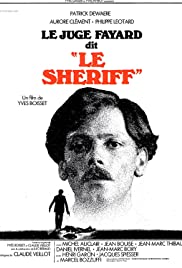
JUDGE FAYARD CALLED THE SHERIFF
France, 1977, 115 minutes, Colour.
Patrick Dewaere, Aurore Clement, Philippe Leotard.
Directed by Yves Boisset.
Judge Fayard Called the Sheriff is an excellent French police drama. Produced in the mid-70s, although it says it has no resemblance to real characters, it was based on characters in the French city of Lyon.
Patrick Dewaere is excellent as the young judge who is earnest and relentless in his tracking down of criminals. He made a number of successful films before an untimely early death. Aurore Clement is his girlfriend - she made many French films and was seen to advantage in Wim Wenders' Paris Texas. Philippe Leotard is the judge's colleague - he was to emerge as a strong character actor in many French films in the 70s and 80s. There is an excellent supporting cast, including Marcel Bozzuffi (The French Connection).
The city of Lyon is well used for authentic locations. There is a picture of police corruption, social corruption, political and financial terrorism in the aftermath of right-wing groups and the OAS crises of the 60s. Action sequences are well handled, the plot draws audience interest continually, the ending is tragic - and the film is trenchant in its criticism of establishment corruption.
1. The quality of the film as a thriller? A study of police investigations and political and social corruption? In the tradition of the Hollywood and French police films of the 70s?
2. The use of authentic locations in Lyon? The impact of the long opening credits sequence with the helicopter view of the city? The streets, police stations, apartments, cafes, prisons? The action sequences - prison escapes, robberies, car chases, physical violence? Editing and pace? The strong musical score?
3. The credibility of the plot - experiences of police corruption, political connections, financial deals, cover-ups? The French background of right and left-wing clashes? The wars of the 60s - and the right and left-wing attitudes towards Algeria? The military and counter-military terrorist squads? Political assassinations? Robberies to finance public works and private enterprise? The laundering of money in Switzerland? The networks of corruption manifested in the final sequences?
4. The title and the focus on the judge? His nickname of The Sheriff and its merits? Patrick Dewaere's intensity and earnestness? His work, his assistant, Pichon and her continued collaboration? His relationship with Michelle - trying to avoid her, in love with her, their relationship with its ups and downs, the possibility of his marrying her, her grief at his death? His being pictured at work - interrogations, information? The attitudes of his superiors and their warning him off? His work with colleagues and their own investigations, supplying him with information, going to archives and examining files? The initial confrontation with Camus and his arrest? His attack on corrupt businessmen? His being unable to hold him in prison? The service station robbery and his interrogation of Paolo? The uncovering of names in the gang? Sending Paolo out from prison - and his fear? The discovery of Pradal and his work with his gang, the escape, the robbery? The link with Chalabert and politics? The interviews with Marcheron and his girlfriend? The security guards and their being hit-men? Stirrers and strike-breakers? His death? The leads to politicians and businessmen? His building up his case? The confrontation with his superiors? The arrest of Messieurs Paul? The danger to him personally? His being gunned down? A strong picture of a man of principle and integrity?
5. The sketch of his police colleagues - their researchers, information, files? Working against authorities' dishes? Tare and his continued help, friendship? The shoot-out at the manor - and Mare’s injury? Their sadness at the Judge's death? decision to continue the prosecutions and the possibility of uncovering the conspiracy?
6. The portrait of the corrupt French world: Camus as an industrialist, the deaths at his plant, treatment of workers? Marcheron and his contacts? The ex-policeman and his girlfriends? The political connections and protection? The conspiracy of the former officers and their alleged loyalty to France? Monsieur Paul and his power, the laundering of money through Switzerland? brutality, assassinations, masquerading and executing the robbery? His injuring Mare before being killed? The range of
gangsters, their work in robberies, violence? being interrogated by the judge? Their leaving their injured colleague behind and his giving information from hospital? Their killing him in hospital? An ugly picture of corruption and networks?
7. The finale and the revelation of the networking and conspiracy for public works to be promoted by laundered money? The presence of the police, the presence of Monsieur Paul, the presence of the high politician who was on the board of the company and who gave approval for the demolition and rebuilding?
8. The particularly French situations of this story - but the parallels in any other country?
9. An insight into police work, police? pessimistic tone of the film in terms of the Judge being executed? The hope that others will continue to expose corruption?